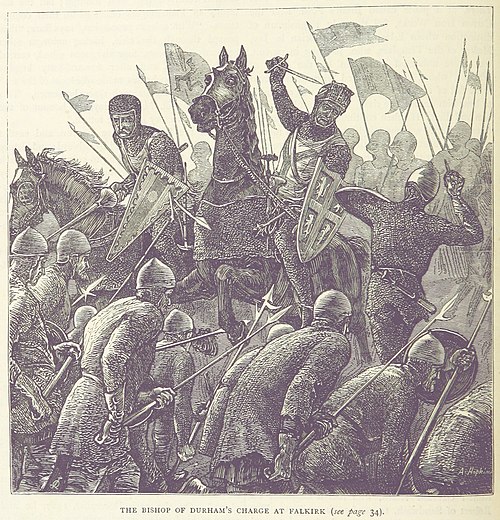Year 1298 Overview
Year 1298 (MCCXCVIII) was a common year starting on Wednesday of the Julian calendar.
Events
By Place
Europe
April 20 – Rindfleisch massacres: The Jews of Röttingen are burned en masse. The Colmar Dominican Rudolph travels from town to town, executing all the Jews he finds. He destroys the Jewish communities at Rothenburg ob der Tauber, Würzburg, Bamberg, Dinkelsbühl, Nördlingen, and Forchheim. In the Free Imperial City of Nuremberg, Jews seek refuge in the castle but are overthrown by Rindfleisch, leading to a massacre on August 1. Over the course of the unrest, Rindfleisch and his forces annihilate 146 communities, resulting in approximately 20,000 Jewish deaths.
June 1 – Battle of Turaida: Forces of the Livonian Order suffer a decisive defeat near Turaida Castle at the hands of residents of Riga, allied with the Grand Duchy of Lithuania under Vytenis. Following reinforcements from the Teutonic Order, the Livonians defeat the Riga residents and Lithuanians at Neuermühlen on June 28. The knights subsequently besiege and capture Riga. A truce arranged by Pope Boniface VIII concludes the conflict.
July 2 – Battle of Göllheim: German forces led by Duke Albert I defeat King Adolf of Nassau over the prince electors’ decision to dethrone Adolf without electoral act. The battle results in Adolf’s death and the destruction of his army along with the loss of 3,000 horses.
September 9 – Battle of Curzola: The Genoese fleet, led by Admiral Lamba Doria, defeats the Venetian fleet at Curzola. The battle results in the near-total destruction of the Venetian fleet, with 83 of the 95 galleys destroyed and approximately 7,000 casualties. During this conflict, Marco Polo is captured while commanding a Venetian ship.
After a year-long siege, the Italian commune of Palestrina near Rome surrenders to the Papal forces and is subsequently destroyed and salted by order of Boniface VIII.
Scotland
In the summer, King Edward I (Longshanks) marches from Newcastle to Alnwick and then to Roxburgh. By July, he encamps at Kirkliston, west of Edinburgh, accompanied by a long procession of supply wagons. Meanwhile, English supply ships face delays due to bad weather, affecting food delivery to Leith.
July 22 – Battle of Falkirk: English forces, numbering around 15,000 troops led by Edward I, defeat the Scottish army commanded by William Wallace. During the battle, the English knights succeed in driving off the Scottish cavalry and archers, but cannot penetrate the fortified Scottish pikemen. The Scottish forces are ultimately destroyed by the English longbow archers.
Asia
Mongol invasion of India: Mongol forces under Qutlugh Khwaja invade the Sindh region of the Delhi Sultanate, capturing the castle of Sivistan (modern-day Pakistan). Sultan Alauddin Khalji dispatches an army led by Zafar Khan, who ultimately defeats the Mongols on February 6, resulting in approximately 20,000 Mongolian casualties. Survivors are taken captive and executed by elephants in Delhi.
August 30 – Emperor Fushimi abdicates after an 11-year reign, succeeded by his 10-year-old son Go-Fushimi as the 93rd emperor of Japan (until 1301).
By Topic
Cities and Towns
August 1 – The “ideal city” of Marciac in southern France is founded by King Philip IV (the Fair) and his Seneschal Guichard de Marzé.
Markets
The foreign creditors of the Sienese Gran Tavola Bank begin demanding their deposits, contributing to the liquidity crisis faced by the firm.
Religion
Ambrose, Augustine, Jerome, and Pope Gregory I are collectively named the first Doctors of the Church, recognized as the Great Doctors of the Western Church.
Technology
Chinese inventor and politician Wang Zhen introduces a wooden movable type printing system, building on the earlier invention of ceramic movable type by Bi Sheng in the 11th century.
Births
August 9 – Robert Ufford, English nobleman and admiral (d. 1369)
August 25 – Gongwon, Korean queen consort of Goryeo (d. 1380)
December 12 – Albert II (the Lame), German nobleman (d. 1358)
- Andrew Murray, Scottish nobleman, knight and politician (d. 1338)
- Angelo Acciaioli, Italian nobleman and cleric (d. 1357)
- Bernat II de Cabrera, Aragonese nobleman and diplomat (d. 1364)
- Charles of Calabria, Italian nobleman (d. 1328)
- Edmond de Burgh, Norman nobleman (d. 1338)
- Elizabeth of Carinthia, Sicilian queen consort (d. 1352)
- Everhard II of Limburg, German nobleman (d. 1344)
- Kunigunde of Poland, Polish princess (d. 1331)
- Peter I of Dreux, French nobleman (d. 1345)
- Qvarqvare I, Georgian prince (d. 1361)
- Zhou Boqi, Chinese magistrate and poet (d. 1369)
Deaths
- January 2 – Lodomer, Hungarian prelate
- March 14 – Peter John Olivi, French theologian (b. 1248)
- March 25 – Siegfried I, German prince (House of Ascania)
- March 27 – William of Louth, English bishop
- April 8 – Andrew Moray, Scottish nobleman
- April 17 – Albrecht II, German nobleman (b. 1235)
- April 17 – Árni Þorláksson, Icelandic cleric (b. 1237)
- May 4 – Frederick VI, German nobleman (d. 1298)
- May 22 – Robert de Tiptoft, Norman landowner
- June 11 – Yolanda of Hungaria, Hungarian princess (b. 1235)
- July 2 – Adolf of Nassau, king of Germany (House of Nassau)
- July 13 or July 16 – Jacobus de Voragine, Italian archbishop
- July 22 – John de Graham, Scottish nobleman
- July 22 – John Stewart, Scottish nobleman
- July 22 – MacDuff of Fife, Scottish nobleman
- July 23 – Thoros III, king of Cilician Armenia (b. 1271)
- August 1 – Mordechai ben Hillel, German Jewish rabbi (b. 1250)
- August 25 – Albert II of Saxony, German nobleman
- August 28 – William Houghton, English diplomat
- August 29 – Eleanor of England, daughter of Edward I (b. 1269)
- September 9 – Andrea Dandolo, Venetian nobleman and admiral
- September 29 – Guido I da Montefeltro, Italian military strategist
- December 31 – Humphrey de Bohun, English nobleman (b. 1249)

